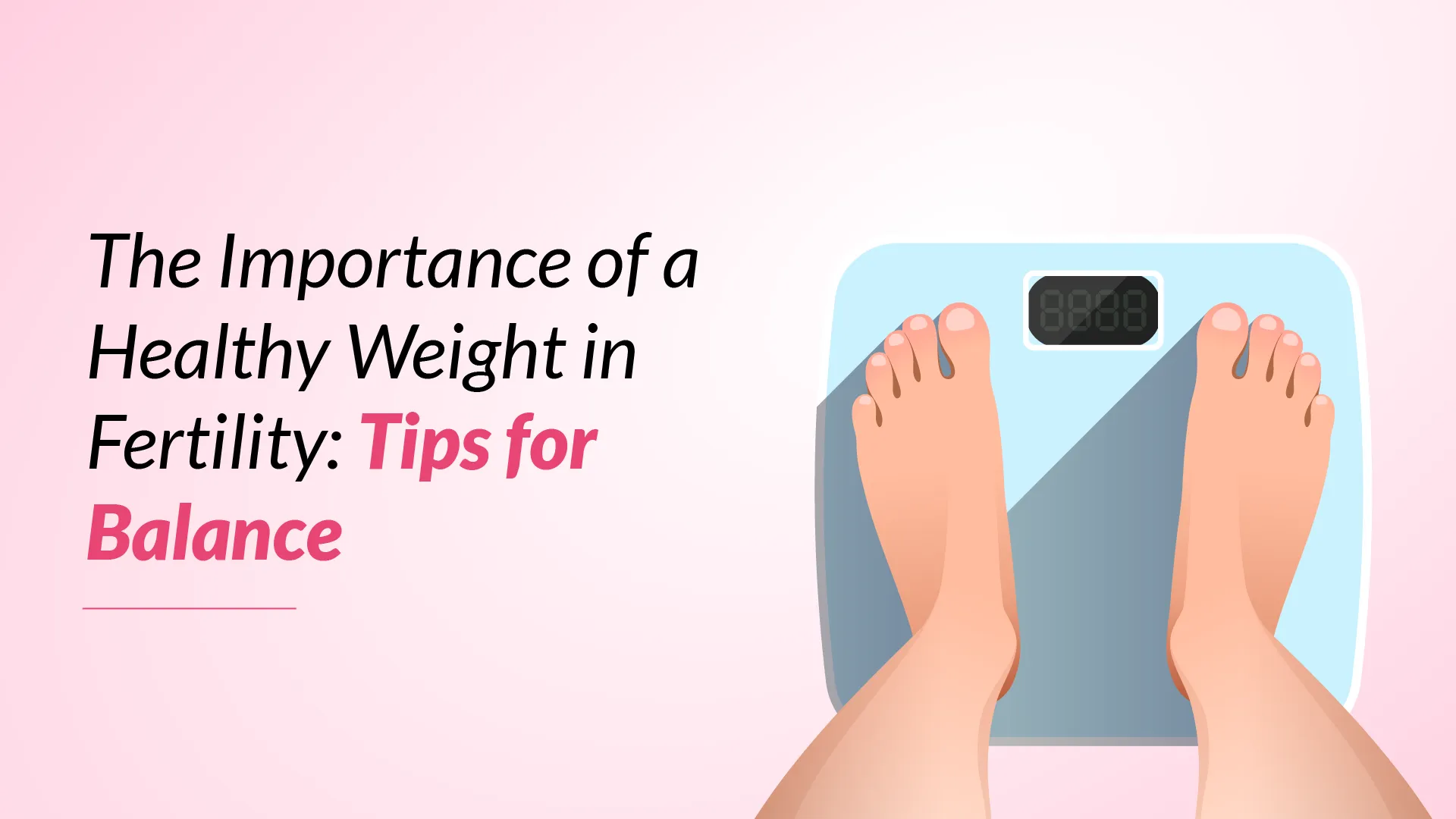Have you ever wondered how much your weight could impact your journey to parenthood? Studies show that achieving a healthy weight for pregnancy can significantly improve your chances of conceiving. Data suggests that women with a BMI above 30 or below 18 had a lower chance of getting pregnant when compared to women with a normal BMI.
While these figures may sound concerning, the good news is that weight can be managed. Understanding the connection between weight and fertility is a powerful step, and small changes can make a big difference. Let’s understand how maintaining an ideal weight for fertility can improve your odds and how achieving it is not as difficult as it may seem.
What Should Be the Ideal Weight for Fertility?
The ideal weight to get pregnant is often measured through Body Mass Index (BMI), which provides a ratio of weight to height. According to most fertility specialists, a healthy BMI for conception falls between 18.5 and 24.9. While it’s important to remember that everyone’s body is unique, this range generally indicates a balance that supports reproductive health.
Using the BMI scale for women specifically, a reading below 18.5 is considered underweight, while anything above 25 is overweight and above 30 is classified as obese. If you’re aiming for a pregnancy-friendly BMI, targeting the 18.5–24.9 range can improve your chances, along with the overall success rates of any fertility treatment for overweight or underweight individuals.
Risk of Getting Pregnant When Overweight
Carrying excess weight may bring along a series of risks when it comes to pregnancy. Getting pregnant when overweight can lead to complications, both before and during pregnancy. Excess weight may increase the risk of miscarriage and conditions like gestational diabetes and preeclampsia.
Being overweight can also lead to polycystic ovary syndrome (PCOS), a condition linked with fertility problems. PCOS is common among women struggling with excess weight, which disrupts menstrual cycles and may make conception challenging.
Also read: Managing Polycystic Ovary Syndrome (PCOS) Without Losing Weight
Overweight and Fertility Issues in Men
Men are equally affected by weight-related fertility issues. Higher levels of body fat may cause hormonal changes that lower testosterone levels, reduce sperm production, and affect sperm quality. Excess fat around the abdomen, for example, has been linked to poor semen quality, reducing the chances of successful fertilization.
Men with an overweight BMI are also more likely to face conditions such as erectile dysfunction, which further complicates efforts to conceive. For those looking to lose weight for fertility purposes, even small reductions in body weight have been shown to improve hormonal balance and sperm quality.
Overweight and Fertility Issues in Female
For women, being overweight can disrupt the balance of hormones essential for ovulation. Women with an elevated BMI usually experience irregular menstrual cycles, which makes it difficult to anticipate ovulation, thus reducing the likelihood of conception. Fertility, obesity, and BMI are closely linked because excess body fat increases estrogen production, which can alter the reproductive cycle and lead to infertility.
Additionally, the chances of requiring fertility treatment for overweight women are higher, as weight impacts the success of treatments such as in vitro fertilization (IVF). Maintaining an ideal weight for fertility can, therefore, be an important part of treatment planning.
The Effects of Being Underweight on Fertility
Just as being overweight poses challenges, being underweight also impacts fertility. Women who fall below the healthy BMI range often struggle with hormonal imbalances that lead to irregular menstrual cycles or even amenorrhea (absence of menstruation). Low body weight is linked to low estrogen levels, a condition that can prevent ovulation and disrupt pregnancy efforts.
In men, low body fat can also reduce sperm quality, as testosterone levels may be affected by insufficient body mass. Finding a balanced, healthy weight is therefore vital for anyone looking to enhance their fertility.
Tips for Achieving and Maintaining a Healthy Weight for Pregnancy
Here are some tips to achieve and maintain a healthy weight for pregnancy:
- Balanced Diet: Eat nutritious foods like vegetables, fruits, whole grains, and lean proteins, and reduce processed foods, sugars, and unhealthy fats to help maintain a healthy weight for pregnancy.
- Exercise Regularly: Regular physical activities like yoga, walking, and swimming can help reduce stress and promote healthy weight management without extreme effort.
- Avoid Extreme Dieting: Crash diets may help with temporary weight loss but can create nutritional deficiencies that negatively impact fertility.
- Track Your BMI: Regularly checking your BMI can give you a clear picture of where you stand in relation to your fertility goals.
- Reduce Stress: High-stress levels can impact weight. Simple practices like deep breathing, meditation, and yoga can help manage stress levels, benefiting both weight and fertility.
- Limit Alcohol and Avoid Smoking: Both alcohol and tobacco impact weight and fertility. Smoking, in particular, is known to lower fertility in both men and women, so reducing or eliminating it can make a significant difference.
Consulting Fertility Specialists Regarding BMI for Fertility Treatment
If you’re considering fertility treatment, discussing your BMI for fertility treatment with a specialist can be highly beneficial. Many fertility centers, such as Ferty9, take BMI into account as part of their comprehensive assessment of each individual’s fertility journey. Specialists may offer guidance on weight management or suggest lifestyle modifications that align with your fertility goals. They understand the connection between weight and fertility and can guide you in making the right choices.
Conclusion
Weight has a considerable influence on fertility, but it’s a factor you can control with the right approach. Whether you’re aiming to conceive naturally or preparing for assisted reproductive treatment, focusing on a healthy weight for pregnancy can make a positive impact on your journey.
If you’re looking for a supportive team to guide you through your weight and fertility goals, Ferty9 Fertility Center is here to help. Their dedicated professionals can offer insights and tailored solutions to improve your chances of a successful pregnancy.





























